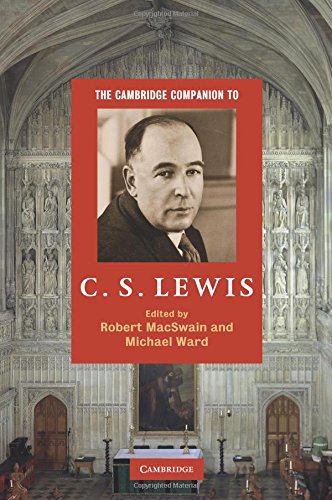The Cambridge Companion to C.S. Lewis

The Cambridge Companion to C.S. Lewis. Robert MacSwain and Michael Ward, eds. Cambridge: Cambridge University Press, 2010. 326 pp. $29.99 pbk. $90.00 hbk. 978-0-5217-1114-2.
Reviewed by Gregory Bassham
[This review originally appeared in Mythlore 113/114.]
There are many sides to C. S. Lewis, some better known than others. Easily the most familiar Lewis is the Lewis of American evangelical piety. Each year the evangelical presses disgorge a flood of books that celebrate Lewis the Bonny Apologist, the twentieth century’s greatest defender of the faith; Lewis the Narnian, masterly writer of children’s fantasy; and Lewis the Spiritual Director, author of inspiring devotional works. But there are other aspects of Lewis’s many-sided genius that are not so widely known. How does Lewis rank, for instance, as a poet or literary critic? What were his talents and contributions as an intellectual historian, a classicist, a novelist, a literary theorist, a philosopher, and a theologian? In this urbane and highly readable book a distinguished (and mostly non-evangelical) team of scholars examines these and other neglected aspects of Lewis’s thought and career.
What emerges is a picture of a mind of remarkable power and versatility. Malcolm Guite makes a persuasive case that Lewis is underrated as a poet and that much of his early poetry is more modernist than is generally assumed. John V. Fleming examines Lewis’s achievements as a literary critic, noting that Lewis’s first scholarly book, The Allegory of Love, was like “a powerful explosion, wholly unanticipated, that staggered literature faculties throughout Britain” (18). Other valuable chapters assess Lewis’s achievements as an intellectual historian, a literary theorist, and a classicist.
Though it appears in the Cambridge Companions to Religion series, only a few chapters deal specifically with Lewis’s religious views. In contrast to many evangelical treatments, very little is said about his well-known apologetical arguments for Christ’s divinity (“Lewis’s Trilemma”), the reality of heaven (“the argument from desire”), and God’s existence (“the moral argument”).
There is a fascinating chapter by Charles Taliaferro on Lewis’s attempt to refute naturalism—the so-called “argument from reason.” In Miracles (1947; 2nd ed. 1960), Lewis argues that naturalism—the view that only nature exists and that all events are naturally determined—cannot explain the existence of reasoning. Naturalism, Lewis says, implies that all mental inferences—all thoughts of the form “A implies B”—are fully explainable in terms of brain chemistry and other non-rational processes. Yet reasoning exists only when the mind moves from A to B solely because it sees that A implies B, and for no other reason. Thus naturalism cannot explain the existence of reasoning, and in fact cannot be rationally defended since it implies that there are no good reasons for any view, including naturalism itself. Naturalism, in short, is hoist on its petard.
Does this argument prove that something “beyond nature” exists? As Taliaferro notes, it does not. Very few naturalists deny the existence of reasons, inferences, and acts of rational insight. Rather, these are seen as parts of “nature,” understood as the totality of physical reality and those events and processes that emerge naturally from that physical system. At best, as Taliaferro points out, the argument has force only against a strict and implausible form of naturalism that claims that everything can ultimately be explained in terms of physics.
While all the book’s contributors are clearly admirers of Lewis, several take issue with some of his traditionalist views. Three notable examples include Ann Loades’s courteous but incisive critique of Lewis’s rejection of women priests, Caroline J. Simon’s critical probing of what she sees as Lewis’s male-biased view of friendship (only shared interests, please, no intimacy or self-disclosure), and Stanley Hauerwas’s game attempt to prove that Lewis should have been a total pacifist.
One of the most interesting discussions in the books is Alan Jacobs’s rather tortured attempt to defend Michael Ward’s widely-hailed “Narnia code” reading of the Narniad. In his 2008 book, Planet Narnia, Ward claimed to have discovered what he termed “the secret imaginative key” to the 60-year-old children’s series. Each of the seven books, he claimed, is cleverly organized around themes associated with one of the seven pre-Copernican planets: Mercury, Venus, Mars, Jupiter, Saturn, the Sun, and the Moon. The unhappy fate of similar code-readings of works such as the Bible, the Prophecies of Nostradamus, and most recently the Harry Potter series should caution readers to take a long, hard look before embracing Ward’s thesis. Curiously, Jacobs notes one massive problem with Ward’s reading—a 1957 letter in which Lewis told an American boy that when he wrote The Lion, the Witch, and the Wardrobe, he didn’t plan to write any more Narnia stories (269). How, then, could Lewis have had a secret plan to encode esoteric astrological correspondences in each of the seven books? Did he lie to the boy, or forget a few short years later how the books came to be written? Neither explanation is likely.
Though readers naturally will find some chapters more interesting or insightful than others, it is a well-written and well-edited collection. The editors have assembled a constellation of top Lewis scholars and distinguished academics to survey the full range of Lewis’s talents and achievements. It is a welcome and overdue book.

